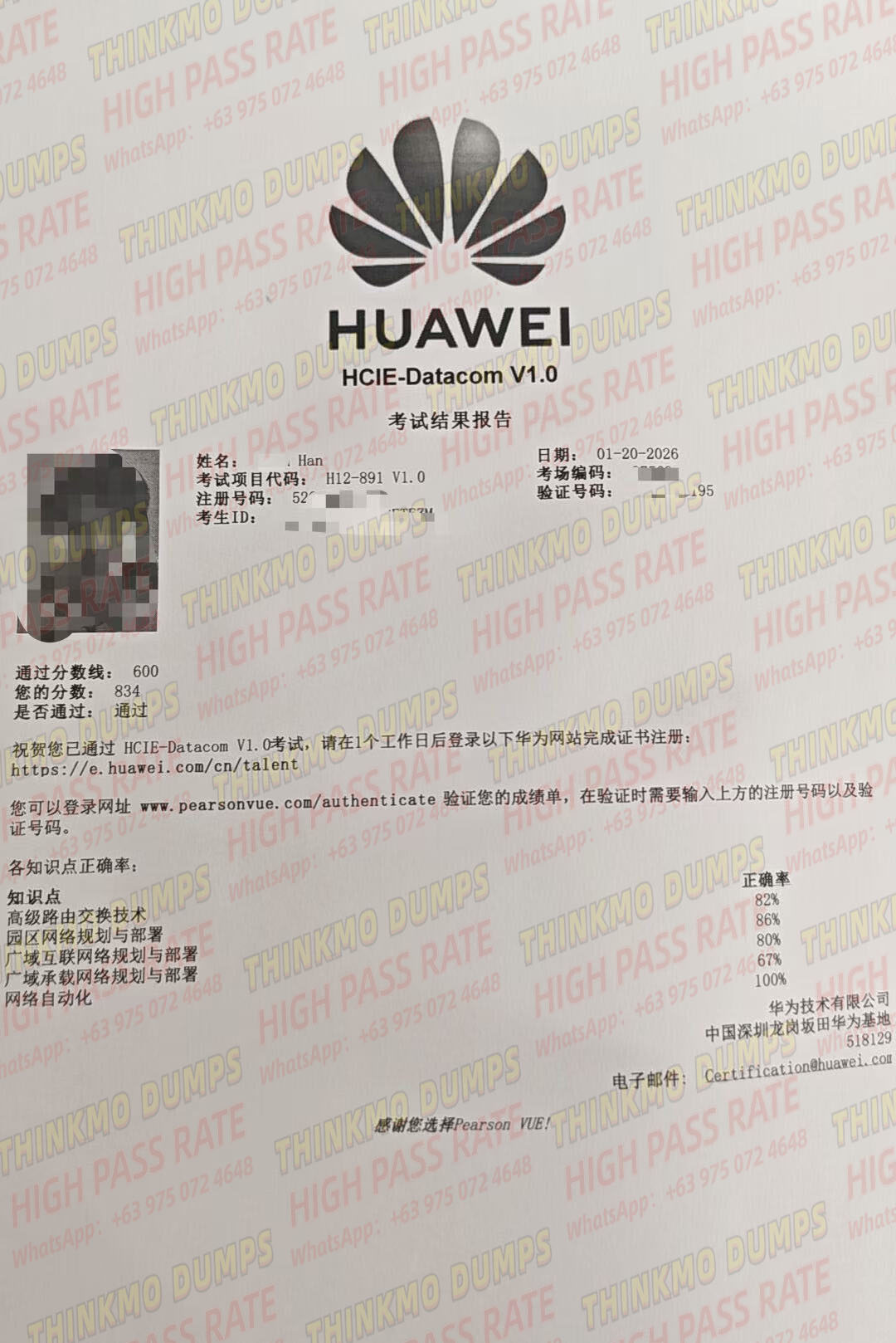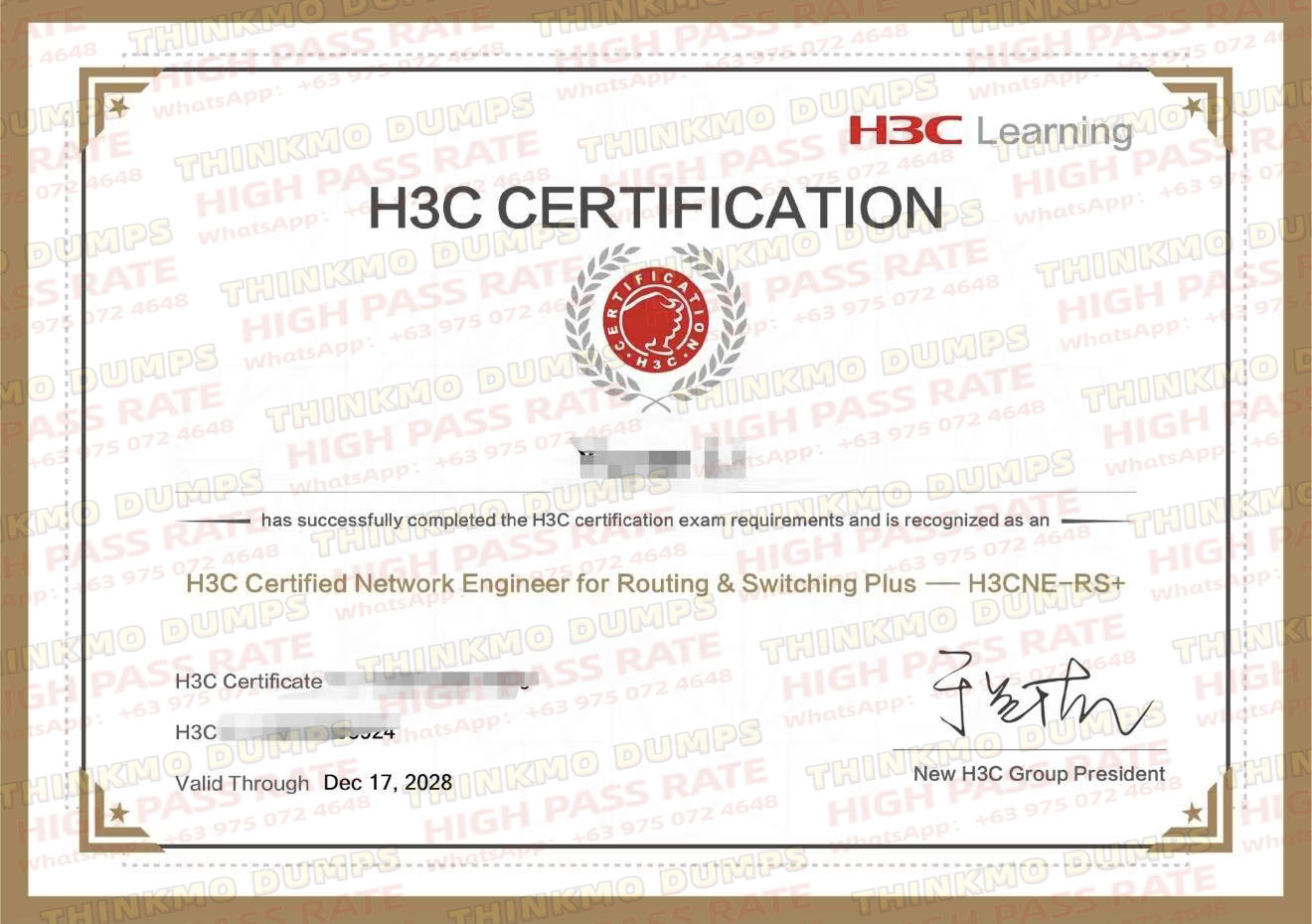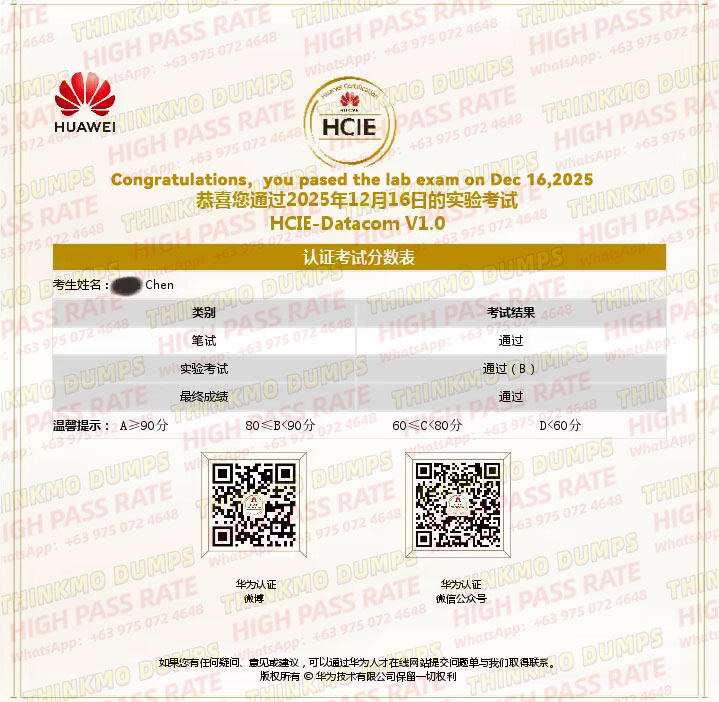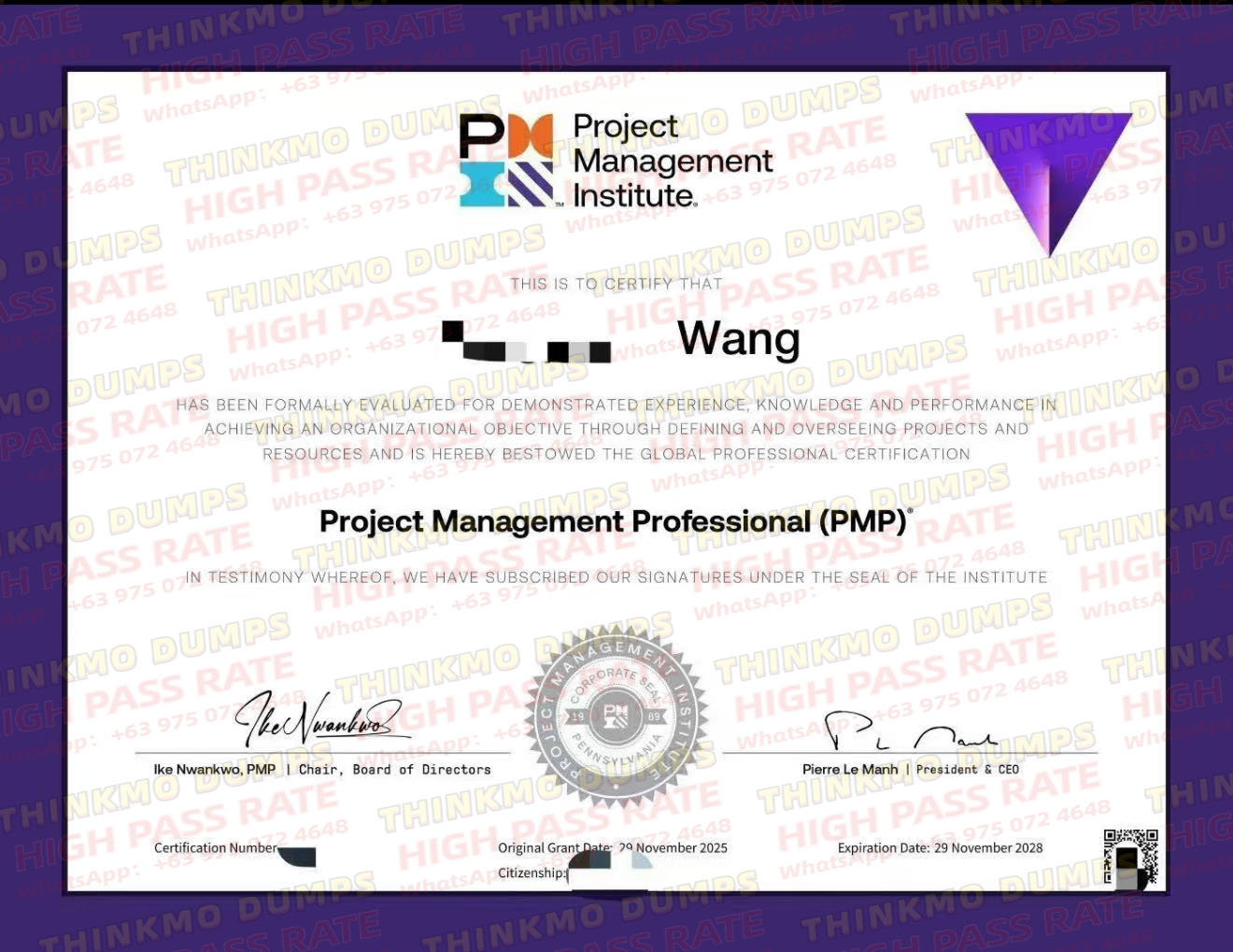What is a Huawei Certified Network Engineer?
Update time:2025-09-06
Many people ask: “What exactly is a Huawei Certified Network Engineer?What kind of jobs can I do with this certification?”
Having worked in the networking industry for years, let me break this down clearly.

1.Certification Path: A Three-Level Ladder from Beginner to Expert
Huawei’s Network Engineer certification is structured in three levels, each aligned with different technical capabilities and career stages:

1) HCIA – Entry-Level Certification
Focus: Networking fundamentals, covering TCP/IP, VLAN segmentation, and basic Huawei device configuration.

Exam: Computer-based theoretical test, 90 minutes, pass mark 600/1000.

Value: Considered an industry “entry ticket”, especially for recent graduates or career switchers, proving solid foundational networking knowledge.
2) HCIP – Intermediate Certification
Focus: Enterprise-level network deployment and optimization, including advanced OSPF, BGP routing policies, and VXLAN technologies.

Exam: Two theory exams (some tracks include a lab component), 90 minutes each, 600/1000 pass mark.

Value: Often viewed as a hidden threshold in hiring for mid-level engineers.Demonstrates the ability to independently configure medium-sized networks and troubleshoot operational issues.
3) HCIE – Expert-Level Certification
Focus: End-to-end architecture design and complex troubleshooting.

Exam: Written test (90 minutes) + 8-hour lab exam.The lab requires building a large-scale network from scratch and solving multiple faults.

Value: HCIE holders are highly sought after for core project roles, architect positions, and high-paying opportunities.It’s also a recognized qualification for Huawei technology summits and partner programs.
2.Core Track: Datacom as the Foundation
The Datacom track is the backbone of networking, focusing on routing, switching, and network interconnection.
Why Datacom first?
Broad Applications: Enterprise LANs, carrier backbone networks, and data centers all rely on Datacom.
Strong Transferability: Other tracks (Cloud, Security, etc.) are built on Datacom fundamentals.
High Job Demand: Nearly every IT department requires Datacom engineers, making it the most versatile career path.
Other directions (Cloud, Security) are valuable, but it’s best to build a Datacom foundation before branching out.
3.Career Value of Huawei Certification
1) Hiring Advantage – The “Hidden Signal”
Many enterprises—from office networks to 5G carriers—deploy Huawei equipment.Huawei’s ecosystem partners, telecom operators, and government IT departments frequently prioritize certified candidates.
2) Career Growth – The Ladder Effect
Fresh graduates / career switchers → HCIA opens doors.
Engineers with 1–3 years experience → HCIP validates project-level skills and helps with salary increases.
Senior engineers → HCIE enables a shift to architect or management roles.(Data shows 65% of HCIE holders move into management within 3 years.)
3) Technology Framework – Beyond Just the Certificate
HCIP covers mainstream tech like SDN and IPv6.
HCIE involves cutting-edge topics like network automation.
The preparation process itself builds a complete technical system, which often outweighs the certificate alone.
Conclusion: Certification is a Tool, Skills are the Foundation
The essence of Huawei certification is skills gained during preparation.The certificate is simply the key to opportunities.
Newcomers: Start with HCIA Datacom.
Experienced engineers: Target HCIP or HCIE for deeper expertise.
I'm your man who have the 100% valid dumps , buy it now for 50% off to clear your exam!
Click it ↓↓

Having worked in the networking industry for years, let me break this down clearly.

1.Certification Path: A Three-Level Ladder from Beginner to Expert
Huawei’s Network Engineer certification is structured in three levels, each aligned with different technical capabilities and career stages:
1) HCIA – Entry-Level Certification
Focus: Networking fundamentals, covering TCP/IP, VLAN segmentation, and basic Huawei device configuration.
Exam: Computer-based theoretical test, 90 minutes, pass mark 600/1000.
Value: Considered an industry “entry ticket”, especially for recent graduates or career switchers, proving solid foundational networking knowledge.
Tip: Use HCIA past exam dumps to familiarize yourself with the exam format and key topics.
2) HCIP – Intermediate Certification
Focus: Enterprise-level network deployment and optimization, including advanced OSPF, BGP routing policies, and VXLAN technologies.
Exam: Two theory exams (some tracks include a lab component), 90 minutes each, 600/1000 pass mark.
Value: Often viewed as a hidden threshold in hiring for mid-level engineers.Demonstrates the ability to independently configure medium-sized networks and troubleshoot operational issues.
Tip: Practice with HCIP dumps to prepare for case-style questions.
3) HCIE – Expert-Level Certification
Focus: End-to-end architecture design and complex troubleshooting.
Exam: Written test (90 minutes) + 8-hour lab exam.The lab requires building a large-scale network from scratch and solving multiple faults.
Value: HCIE holders are highly sought after for core project roles, architect positions, and high-paying opportunities.It’s also a recognized qualification for Huawei technology summits and partner programs.
Tip: Use HCIE lab simulation dumps to practice time management and complex troubleshooting before attempting the full 8-hour exam.
2.Core Track: Datacom as the Foundation
The Datacom track is the backbone of networking, focusing on routing, switching, and network interconnection.
Why Datacom first?
Broad Applications: Enterprise LANs, carrier backbone networks, and data centers all rely on Datacom.
Strong Transferability: Other tracks (Cloud, Security, etc.) are built on Datacom fundamentals.
High Job Demand: Nearly every IT department requires Datacom engineers, making it the most versatile career path.
Other directions (Cloud, Security) are valuable, but it’s best to build a Datacom foundation before branching out.
3.Career Value of Huawei Certification
1) Hiring Advantage – The “Hidden Signal”
Many enterprises—from office networks to 5G carriers—deploy Huawei equipment.Huawei’s ecosystem partners, telecom operators, and government IT departments frequently prioritize certified candidates.
2) Career Growth – The Ladder Effect
Fresh graduates / career switchers → HCIA opens doors.
Engineers with 1–3 years experience → HCIP validates project-level skills and helps with salary increases.
Senior engineers → HCIE enables a shift to architect or management roles.(Data shows 65% of HCIE holders move into management within 3 years.)
3) Technology Framework – Beyond Just the Certificate
HCIP covers mainstream tech like SDN and IPv6.
HCIE involves cutting-edge topics like network automation.
The preparation process itself builds a complete technical system, which often outweighs the certificate alone.
Conclusion: Certification is a Tool, Skills are the Foundation
The essence of Huawei certification is skills gained during preparation.The certificate is simply the key to opportunities.
Newcomers: Start with HCIA Datacom.
Experienced engineers: Target HCIP or HCIE for deeper expertise.
If you want to prepare efficiently, try our Huawei Certification Dumps (HCIA/HCIP/HCIE).They include real exam-style questions, explanations, and lab simulations, helping you quickly grasp key points and boost pass rates.
Remember: A network engineer’s value lies in solving problems.The certificate just makes that value easier to be recognized.I'm your man who have the 100% valid dumps , buy it now for 50% off to clear your exam!
Click it ↓↓

Hot article
-
 1
1 1. ThinkMo Precise Question Bank: Ace HCIE Written
上传:2026-01-23
-
 2
2 Triple H3CNE/H3CSE Passes | ThinkMo Christmas Succe
上传:2025-12-25
-
 3
3 Success Streak: ThinkMo’s Dec HCIE-Datacom Win
上传:2025-12-24
-
 4
4 ThinkMo Guide: Cisco & Huawei Certification Com
上传:2025-12-22
-
 5
5 Pass CCIE/CKA Exams with ThinkMo’s Top Question B
上传:2025-12-19








